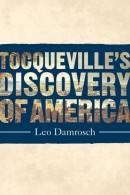A weekly roundup of noteworthy reviews from other sources.
 François Furstenberg says it’s “an opportune moment” for Leo Damrosch’s new book about Tocqueville’s tour of America: “At a time when generalizations about the American soul seem risky at best, it is somehow reassuring to learn that even the great Tocqueville was often winging it—and that some of his direst fears have not come to pass.” David S. Reynolds says, “While Damrosch’s book doesn’t come close to identifying real-life sources for all of Tocqueville’s arguments—no book of such concision could do that—it usefully connects specific themes to certain American locales.” . . . Michael Kazin says a new book about political violence in 19th-century America “takes a topic of undeniable historical significance and reduces it to a left-wing style of mush.” . . . This Wednesday marks the centenary of Mark Twain’s death. Several books have been published to more or less coincide with it. John Sutherland reviews five of them. . . . Jim Crace has said that All That Follows will be his penultimate novel. (I am sincere. But I might be fooling myself.”) Richard Eder says that, in it, Crace has created convincing people but has put them in a story “thinly and hastily contrived.” . . . Novelist Rupert Thomson’s latest tells the real-life story of the strange ways in which he and his two brothers dealt with the death of their father: “You might cynically wonder why Thomson should wish to tap into the lucrative memoir-market eight novels into his career; and there are points at which he lapses into the standard tropes of the genre. But for the most part it is written in the precise, wiry prose that brings hallucinatory intensity to his fiction.”
François Furstenberg says it’s “an opportune moment” for Leo Damrosch’s new book about Tocqueville’s tour of America: “At a time when generalizations about the American soul seem risky at best, it is somehow reassuring to learn that even the great Tocqueville was often winging it—and that some of his direst fears have not come to pass.” David S. Reynolds says, “While Damrosch’s book doesn’t come close to identifying real-life sources for all of Tocqueville’s arguments—no book of such concision could do that—it usefully connects specific themes to certain American locales.” . . . Michael Kazin says a new book about political violence in 19th-century America “takes a topic of undeniable historical significance and reduces it to a left-wing style of mush.” . . . This Wednesday marks the centenary of Mark Twain’s death. Several books have been published to more or less coincide with it. John Sutherland reviews five of them. . . . Jim Crace has said that All That Follows will be his penultimate novel. (I am sincere. But I might be fooling myself.”) Richard Eder says that, in it, Crace has created convincing people but has put them in a story “thinly and hastily contrived.” . . . Novelist Rupert Thomson’s latest tells the real-life story of the strange ways in which he and his two brothers dealt with the death of their father: “You might cynically wonder why Thomson should wish to tap into the lucrative memoir-market eight novels into his career; and there are points at which he lapses into the standard tropes of the genre. But for the most part it is written in the precise, wiry prose that brings hallucinatory intensity to his fiction.”

